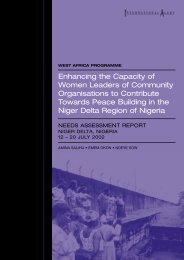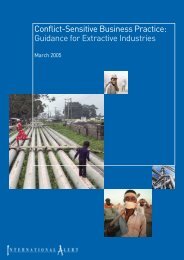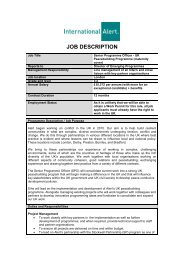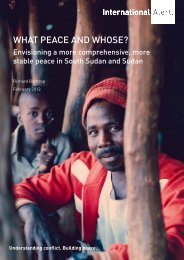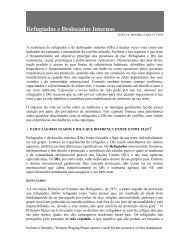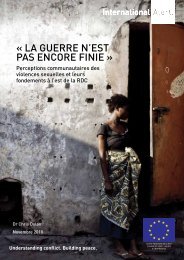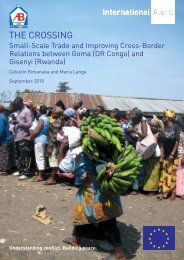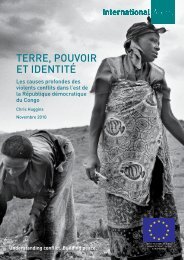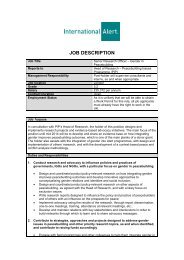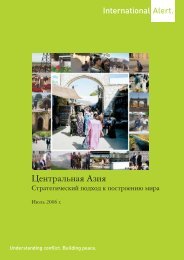The complexiTy of resource governance in a conTexT of sTaTe ... - Ipis
The complexiTy of resource governance in a conTexT of sTaTe ... - Ipis
The complexiTy of resource governance in a conTexT of sTaTe ... - Ipis
You also want an ePaper? Increase the reach of your titles
YUMPU automatically turns print PDFs into web optimized ePapers that Google loves.
<strong>The</strong> complexity <strong>of</strong> <strong>resource</strong> <strong>governance</strong> <strong>in</strong> a context <strong>of</strong> state fragility: An analysis <strong>of</strong> the m<strong>in</strong><strong>in</strong>g sector <strong>in</strong> the Kivu h<strong>in</strong>terlands<br />
53<br />
merchandise is brought up to Mambasa and Nia-Nia to exchange for gold, or cash is used. <strong>The</strong><br />
pre-f<strong>in</strong>anc<strong>in</strong>g <strong>of</strong> artisanal sites by Butembo comptoirs is an important dimension <strong>in</strong> terms <strong>of</strong> the<br />
power and trade dynamics.<br />
Other observations regard<strong>in</strong>g the m<strong>in</strong>eral trade<br />
Some important observations made by the authors throughout the research on the local trade<br />
dynamics are worth mention<strong>in</strong>g.<br />
First is the role and <strong>in</strong>volvement <strong>of</strong> FARDC soldiers <strong>in</strong> trad<strong>in</strong>g goods around m<strong>in</strong>e sites, notably<br />
cigarettes and marijuana. This will be treated <strong>in</strong> Section 3.4.<br />
Second is the virtual absence <strong>of</strong> cash circulat<strong>in</strong>g <strong>in</strong> the large majority <strong>of</strong> sites surveyed <strong>in</strong> Bafwasende<br />
territory. 209 Several sources confirm the existence <strong>of</strong> entrenched barter<strong>in</strong>g systems <strong>in</strong> which the<br />
day-to-day goods needed by artisanal m<strong>in</strong>ers are traded for gold and cash is banned (BOX 7).<br />
BOX 7<br />
Barter<strong>in</strong>g systems and their consequences<br />
<strong>The</strong> widespread existence <strong>of</strong> barter<strong>in</strong>g systems at m<strong>in</strong><strong>in</strong>g sites means artisanal m<strong>in</strong>ers operate<br />
outside the cash economy. <strong>The</strong> practice, referred to as troc, does not seem to be very common <strong>in</strong><br />
other m<strong>in</strong><strong>in</strong>g areas <strong>of</strong> the prov<strong>in</strong>ce but barter has been a known practice <strong>in</strong> other trade economies <strong>of</strong><br />
DRC’s history, whether through lack <strong>of</strong> cash or as a safeguard aga<strong>in</strong>st <strong>in</strong>flation. In some militarised<br />
areas, the army and armed groups are also known to barter m<strong>in</strong>erals for commodities such as<br />
charcoal, cattle or arms. 210 .<br />
Léonard Wande, <strong>in</strong> his July 2009 report on the Opienge area, notes that the Mayi-Mayi Simba traded<br />
m<strong>in</strong>erals for arms as early as 1964, us<strong>in</strong>g middlemen from Walikale and Lubutu territories. 211 Field<br />
<strong>in</strong>terviews for the current research <strong>in</strong>dicate troc cont<strong>in</strong>ues to exist today.<br />
Two observations can be made on this barter<strong>in</strong>g system <strong>in</strong> civilian m<strong>in</strong><strong>in</strong>g contexts. Firstly, a barter<strong>in</strong>g<br />
economy is generally found <strong>in</strong> areas far from major town centres. Secondly, it may <strong>in</strong>dicate the limited<br />
f<strong>in</strong>anc<strong>in</strong>g a m<strong>in</strong>e operator has at his or her disposal.<br />
Regardless <strong>of</strong> its rationale, barter<strong>in</strong>g systems have crippl<strong>in</strong>g effects on the social and economic<br />
conditions <strong>of</strong> artisanal m<strong>in</strong>ers and their families. Often troc effectively renders m<strong>in</strong>ers captive to<br />
the m<strong>in</strong>e’s operators, mak<strong>in</strong>g them similar to <strong>in</strong>dentured labourers. One <strong>in</strong>terviewee <strong>in</strong> Mambasa<br />
suggested that troc denies m<strong>in</strong>ers upward economic and social mobility s<strong>in</strong>ce they have no cash to buy<br />
goods, nor to send back to families. 212<br />
This last po<strong>in</strong>t is very important s<strong>in</strong>ce artisanal m<strong>in</strong>ers rarely br<strong>in</strong>g their wives and children to m<strong>in</strong>e<br />
sites, and can be away from home for months if not years. It is not uncommon to hear accounts <strong>of</strong> wives<br />
who are left to support their families alone once a man leaves for the m<strong>in</strong>e. Female-headed, s<strong>in</strong>gleearn<strong>in</strong>g<br />
households are common <strong>in</strong> DRC m<strong>in</strong><strong>in</strong>g communities. 213<br />
Thirdly, Butembo is mostly supplied with gold from Orientale. 214 CEEC recognises that a large<br />
part <strong>of</strong> the gold traded <strong>in</strong> Butembo orig<strong>in</strong>ates from Orientale, particularly Haut-Uele and Ituri<br />
209 This is also true <strong>in</strong> Bakaiko Groupement <strong>in</strong> Mambasa territory, although little <strong>in</strong>formation is available.<br />
210 <strong>The</strong>re are known examples <strong>of</strong> this system <strong>in</strong> North Kivu, both <strong>in</strong> Virunga and Maiko National Parks, and <strong>in</strong> m<strong>in</strong>es near Walikale.<br />
211 L. Wande (2009) op. cit. Pp12-13.<br />
212 Field <strong>in</strong>terview, June 2010.<br />
213 Pact Inc. has extensively documented cases <strong>in</strong> Orientale and Katanga Prov<strong>in</strong>ces.<br />
214 Observation based on an analysis <strong>of</strong> CEEC Butembo statistical records for 2009 and 2010.



